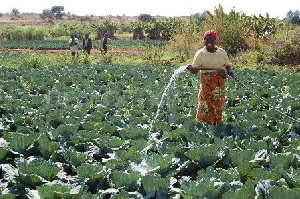Inaccessibility to improved and certified vegetable seed varieties has led to perpetually poor yields, consequential to investment losses and a high poverty rate among vegetable-farmers at Achirensua in the Asutifi-South District of the Brong Ahafo Region.
Exotic vegetables such as lettuce, cabbage and cucumber have increasingly become common in many Ghanaian diets and grow extremely well almost throughout the year; but farmers hardly come by the approved seeds for cultivation.
This situation the farmers have allied to what they call a “huge gap” between themselves and the Seed Production Unit of the Ministry of Food and Agriculture (MoFA), Crop Research Institute (CRI) of the CSIR, KNUST and other seeds-research institutions -- hence the prevalence of inaccessibility, unavailability and high cost of improved vegetable seed varieties.
The USAID through MoFA, according to the farmers, is the prime source from which they can obtain the appropriate seeds -- but the supply has been frozen. Farmers therefore have to rely on some few private outlets where the authenticity and quality of seeds sold at exorbitant prices cannot be guaranteed; therefore, mostly when they are planted they do not grow well.
This informed a BUSAC-funded research to ascertain the severity of the challenge, whereby it has been revealed that about 95% of vegetable farmers in the country recycle seeds from their own produce season after season.
The development thus affects the quality and quantity of the handful of exotic vegetable yields, especially cauliflower and carrots produced locally. As a result, the farmers primarily target expatriates in the country as market source, reducing the quantum allocated to the open market for public consumption.
The findings of BUSAC is contrary to a research by the World Bank which showed that up to 50% of crop yield increases have come from improved certified seeds, while farmers' access to quality seeds is a key factor for better food yield and nutrition in poor and developing countries.
In recent years, however, many governments in the developing world have reduced public investments in the seed sector; the expectation being that the private sector would bridge the gap. In many places, especially Africa, this has not happened as medium and large seed companies tend to concentrate on producing hybrid seed for high value crops grown by bigger commercial farmers.
The farmers are therefore calling for a practical collaboration between MoFA and other seed research institutions, to not only produce but to also decentralise the supply of seeds to the all-vegetable growing communities in Ghana to make them accessible, available and affordable.
“One such way of effective decentralization is that the already existing agro-chemical dealers, at the community level, should be selected, trained, accredited and roped into the certified seed value chain,” they have proposed. Alternatively, they also advocate the selection, training, certification and accreditation of recognised farmers as improved seed growers who will multiply and supply to farmers.
The expected impact of such a proposed policy solution, they claim, will be a vibrant vegetable producing industry; satisfying consumer needs and adding value to food security; reducing vegetable importation, creating wealth and jobs, and enhancing government revenue.
Business News of Friday, 4 October 2013
Source: B&FT













